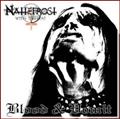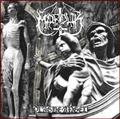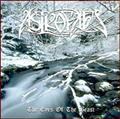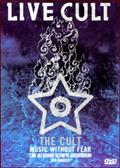INNERFIRE (be) - In Blood We Trust (2004)
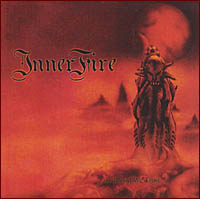
Label : Painkiller Records
Sortie du Scud : 22 novembre 2004
Pays : Belgique
Genre : Dark Doom Metal
Type : Album
Playtime : 6 Titres - 30 Mins
INNERFIRE est un groupe Belge formé en 2002. après deux démos, In Blood We Trust est leur premier album. On pourrait les situer à la limite du Dark et du Doom.
Déjà deux chants gutturaux sont utilisés (pour la même personne, Dahl), l'un en grave et l'autre aigu. Ce dernier aurait pût être mis de côté. Il ne rentre pas du tout dans l'ambiance écorchée de l'album. Le chant grave donne de la puissance, de la force alors que l'aigu discrédite un peu le mélange, au début de « Realms Of Despair » par exemple. Fort heureusement c'est le chant grave qui est mise en avant (« In Blood We Trust »). La très grande force d'INNERFIRE, ce qui pourrait vraiment leur donner du poids, c'est le clavier de Florian. Il l'utilise de façon phénoménale. Ça donne presque un côté épique à leur musique (« Realms Of Despair »,). Quand le morceau s'essouffle un peu, dût à la guitare (Arnaud et Patrick) qui sature trop, où le manque de mélodie, l'ajout de synthé, qui peu apparaître comme un piano (« And Silence Drowned The Sceams ») ou de l'orgue, donne un second souffle à la musique. C'est valable pour presque toutes les pistes avec des résultats réussis pour « Ashes To Victory », « And Silence Drowned The Sceams ». Pour « December Of My Life », « Ashes To Victory » et « Realms Of Despair », le chanteur guttural grave emploie une voix « normal », presque mélodique. L'effet est bien employé et assure une rupture intéressante. La batterie (Phil) n'est pas originale du tout, elle se contente de battre en rythme avec le moins de sons différents. La basse (Fred) est bien plus maîtrisée avec d'excellents riffs. La guitare quant à elle consolide ce côté épique du son avec des parties instrumentales très bien jouées (« In Blood We Trust »).
L'album est un peu court (30 min à peine) pour ce qu’il y a l'intérieur. Mais l'écoute reste agréable dans l'ensemble.
Ajouté : Lundi 10 Novembre 2008
Chroniqueur : Kevineclipse
Score :    
Lien en relation: Innerfire Website
Hits: 10817
|




